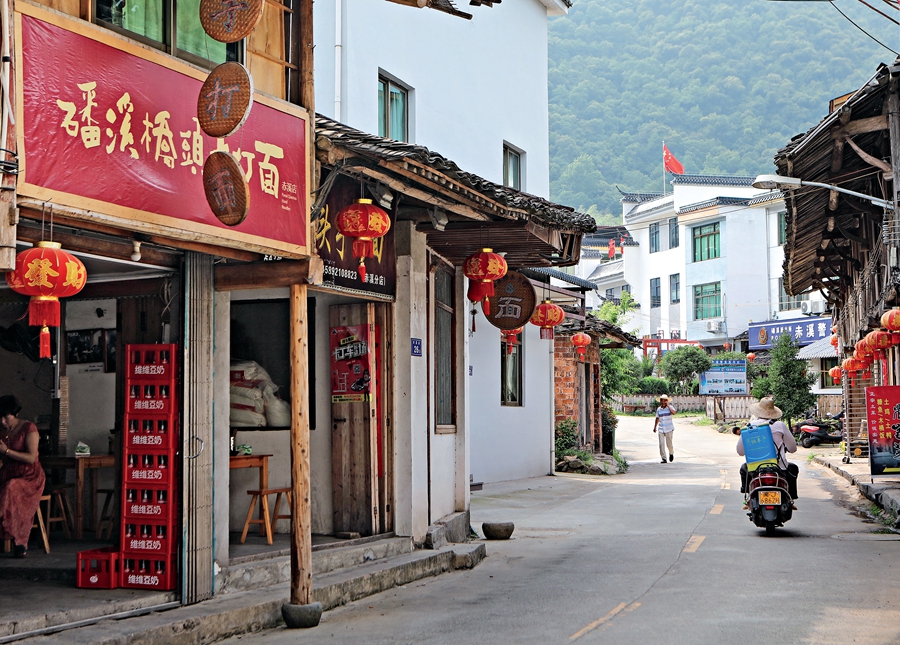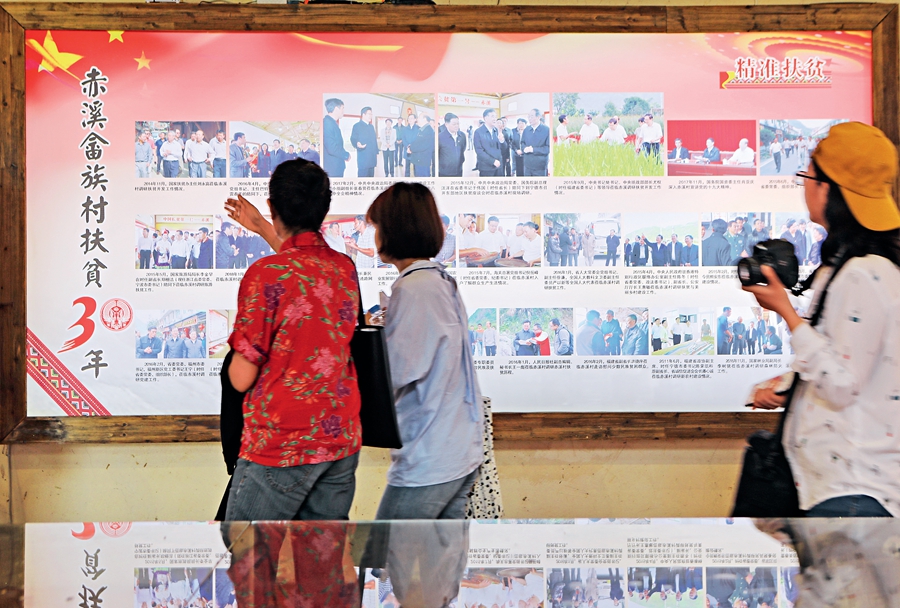IN 2001, 20-year-old Zhong Limei went to Chixi Village in southeast China’s Fujian Province for the first time with her boyfriend. “I was dumfounded when I saw there was no road that can lead our bus to the village, so we had to get off the bus at Longting, the nearest bus stop to the village, climb over a mountain, and walk to the village along a winding and narrow road,” Zhong recalled.
In 2003, despite her unsupportive parents, Zhong still married her boyfriend and moved to Chixi Village. Today, she is director of the local women’s federation and a pioneer in developing local tourism. “The biggest change for my family is that we moved from a shabby wooden house to a beautiful concrete villa, with extra rooms to accommodate visiting tourists,” said Zhong, whose changing life is a shining example of change across Chixi Village.
Poverty Relief in Three Decades
Three decades ago, Chixi was an impoverished and remote village, with over 280 households, mainly people of the She ethnic group, residing in 14 isolated natural villages that had neither electricity, running water, nor roads.

Restaurants and guesthouses line the street in Chixi.
On June 24, 1984, the People’s Daily published an article describing the poverty in the village. It drew attention from the CPC Central Committee and the State Council. Three months later, the CPC Central Committee issued an announcement about the launch of a nationwide poverty reduction campaign. Chixi Village was one of the first villages to be included in the campaign; therefore, it was dubbed “China’s first poverty reduction village.”
“At that time, local residents lived in thatched houses, used kerosene lamps, and had very limited choices for food. In summary, we lived in extreme poverty,” said Du Jiazhu, the Party branch secretary of Chixi. He explained that Chixi Village shook off poverty in three phases over the past three decades.
“The first phase was from 1984 to 1993, and I would call it the ‘blood transfusion’ phase. After our situation was published in the newspaper, we received help in various forms from governments at different levels and people around the country, such as fruit trees and livestock, including rabbits and lambs. They wanted to help us develop a local economy,” said Du. However, due to the lack of planting and breeding techniques, the locals failed and didn’t earn money. The “blood transfusion” turned out to be in vain.
Poverty gives rise to a desire for change. In 1994, roads were built to connect the central village to the outside world. Then 22 households that lived 7.5 kilometers away on mountains moved into the central area at the base of the mountain. “Residents in 10 other villages also successively moved into the central area,” said Du. With the help and support of different levels of Party committees and governments, the She people that had lived in remote mountainous areas for generations finally had hope of shaking off poverty. “By 1995, over 350 households moved from thatched houses on mountains to brick houses at the base,” said Du. With the support of the local government, a batch of tourist projects and eco-agricultural programs were carried out, allowing people to start their own businesses in their hometown. “Local villagers grow tea and fruit trees, and open restaurants or provide Bed & Breakfast (B&B) services, receiving over 150,000 tourists per year.” Du said it was previously unimaginable for locals to make money just with their houses.

Tourists visit an exhibition on poverty reduction in Chixi Village. Photos by Yu Jie
The third phase from 2007 to 2017 is about “generating blood” by itself, which means reducing poverty largely depends on self-reliance and strong internal motivation. “Alongside the development of rural tourism, we established a professional tourist company in 2016, planning and implementing six projects such as a tourist center and a valley resort in Xiashanxi Village, while at the same time improving tourism infrastructure,” said Du. The fast development of rural tourism substantially boosted locals’ income. Local families like Zhong’s started to develop rural tourism businesses, reaping both intangible profits and a sense of achievement.
“Through 10 years of development, we have developed various tourism offerings such as rafting, picking fruits and vegetables, climbing mountains, and other recreational outdoor activities, by utilizing the village’s natural advantages of beautiful rivers and valleys, as well as old traditional houses,” said Du. Chixi Village saw tremendous changes over the past decade. In 2016, the village saw an inflow of more than 200,000 tourists, with a single-day number reaching 10,000 at most. The tourist industry has brought an average income of RMB 60,000 for each family per year.
“The local people are grateful for the help and support they have received from government and people around the country. They erected a stone tablet on which they inscribed ‘China’s first poverty reduction village’ to let future generations bear in mind where their improved lives came from,” said Du.
On the morning of February 19, 2016, Xi Jinping, general secretary of the CPC Central Committee, chatted with local villagers and government officials in Chixi Village of Ningde City online in a studio of People’s Daily Online. When Xi was the Party chief of Ningde City, he paid great attention to poverty relief of Chixi. President Xi spoke highly of the achievements that locals have made in poverty reduction and hoped for a better life for them.
Through trial and error over the past three decades, Chixi Village has blazed a trail in seeking a balanced development of tourism, agriculture, culture, and environmental protection, with the per capita disposable income increasing from RMB 166 in 1984 to RMB 16,640 in 2017. The local government had a debt of over RMB 100,000 in 1984, but achieved fiscal revenues of about RMB 800,000 in 2017.
Expanding Growth and Opportunities
Crowned as a model tourism village in China, Chixi Village has never slowed down its pace in development. In recent years, with the improvement in infrastructure such as roads and other facilities, Chixi has attracted more and more tourists from around the country. Zhou Xueqin, a local villager, is running a rural tourism business at her house. She admitted that she has witnessed firsthand the changes of Chixi.
“In the very beginning, I had only prepared two to three rooms for B&B services. We occasionally received tourists, but we still needed to do farm work when there were no guests,” Zhou explained about the initial development of rural tourism in the village over 10 years ago. At that time, not much effort was made to promote the village or improve the local infrastructure; the village was unknown to most tourists. Alongside increasing investment made by the governments, the development of rural tourism has entered the fast lane. “Now many locals run businesses to receive tourists, providing restaurants, guesthouses, and recreational activities,” said Zhou. The change that impressed her most is that many young people who went to big cities to work are coming back, as they see new development opportunities in their hometown.
Du Ying from Chixi Village chose to give up the job in the city and return to his hometown after graduating from Guangxi University. “Five years ago, I had opportunities to find a job in a city, but I still came back as I saw great potential in my hometown. I believed the rural revitalization strategy proposed by the government would bring about more opportunities,” said Du. He launched a tea processing business by raising nearly RMB 1 million. He dealt with tea processing in the daytime, and orders via the Internet in the evening, and his company has grown into one of the major players in boosting the local economy.
“My hometown boasts rich tea resources, but we didn’t have a tea processing factory. I was thinking about establishing one myself and I did it. In recent years, I also invited some of my friends who recently graduated or who have worked for a period of time and gained certain experience to join my business,” said Du, who works together with his partners drawing a blueprint for the future development of Chixi.
Today, Chixi Village integrates tourism with ecology. The village established a company to develop local land resources with an overall plan and implementation methods, inviting businesses and investments, while equal attention has been paid to environmental protection. A balance has been achieved between boosting the incomes of locals and building itself into a beautiful rural village.
President Xi emphasized many times when he worked in Ningde that though one is poor, one still needs to have high aspirations. Poverty alleviation requires a change of attitude and the support of education. “The foremost is to uproot our ‘poverty mentality.’ The weak hatchling bird can still be the first to take flight and the poorest can also shake off poverty and become rich first. The most important is that we have this belief and motivation,” said Xi.
For the past few years, the local government in Ningde has insisted on helping local government officials and people change their attitude from idling around and waiting for help and support to seeking growth for a sustainable development by themselves.
Chixi Village serves as a paradigm for the success of how the once poverty-stricken village got itself out of poverty and embarked on development by translating its own advantages into profits.